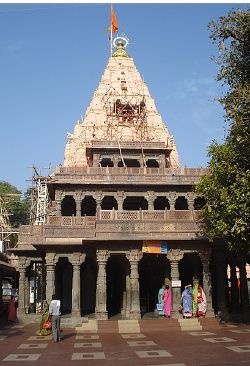Difference between revisions of "Template: Popular article 08 28" - New World Encyclopedia
From New World Encyclopedia
(fixed broken ref tag) |
|||
| Line 1: | Line 1: | ||
{{Main page article box| | {{Main page article box| | ||
type=Popular| | type=Popular| | ||
| − | title= | + | title=Ujjain| |
| − | image_name= | + | image_name=Mahakal Temple Ujjain1.JPG| |
| − | image_desc= | + | image_desc=Mahakal Temple Ujjain| |
| − | text='''[[ | + | text='''Ujjain''' is an [[ancient]] city of [[Malwa]] in central [[India]] on the eastern bank of the [[Kshipra River]]. It has a lengthy history as a capital of the northern region, and served as the capital for [[King Chandragupta II]] (375–415 C.E.), ruler of the [[Gupta empire]]. The epic [[Mahabharata]] speaks of Ujjain as the capital of [[Avanti Kingdom]] during the ancient era, and [[Ashoka the Great]] (304 B.C.E.–232 B.C.E.) resided there. |
| − | + | Ujjain has served as a center of science and culture in northern India. Since the fourth century B.C.E., it has served as the [[Prime Meridian|first meridian of longitude]] for [[Hindu]] [[geographers]]. It also numbers among the seven sacred cities of the [[Hindus]], with the [[Kumbh Mela]] religious [[festival]] held there every twelve years. Ujjain is the home for [[Mahakaleshwar Jyotirlinga]], one of the [[shrine]]s to the god [[Shiva]]. Other noteworthy temples and palaces are also found in the city.}} | |
Revision as of 17:06, 5 June 2019
Popular Article: Ujjain
Ujjain is an ancient city of Malwa in central India on the eastern bank of the Kshipra River. It has a lengthy history as a capital of the northern region, and served as the capital for King Chandragupta II (375–415 C.E.), ruler of the Gupta empire. The epic Mahabharata speaks of Ujjain as the capital of Avanti Kingdom during the ancient era, and Ashoka the Great (304 B.C.E.–232 B.C.E.) resided there.
Ujjain has served as a center of science and culture in northern India. Since the fourth century B.C.E., it has served as the first meridian of longitude for Hindu geographers. It also numbers among the seven sacred cities of the Hindus, with the Kumbh Mela religious festival held there every twelve years. Ujjain is the home for Mahakaleshwar Jyotirlinga, one of the shrines to the god Shiva. Other noteworthy temples and palaces are also found in the city.
